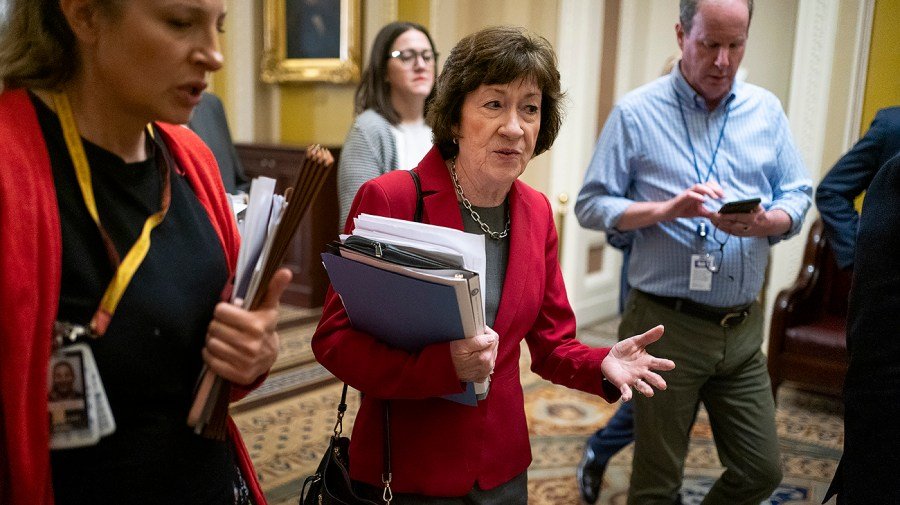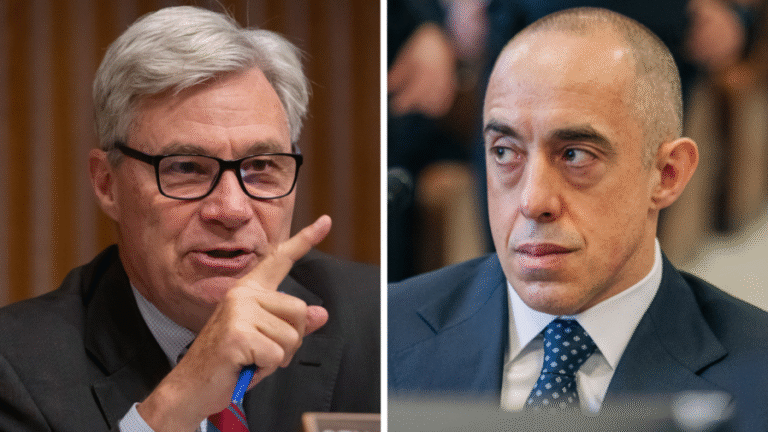
Senate Republicans are moving swiftly to clear key hurdles in their effort to pass a set of spending bills before the August recess and get the ball moving toward avoiding a government shutdown in two months.
Appropriators are crafting a three-bill package that covers full-year funding for the departments of Agriculture (USDA), Veterans Affairs (VA), Commerce, Justice (DOJ), the Food and Drug Administration (FDA), rural development, military construction and science agencies.
Both chambers have fallen behind on their funding work, and appropriators are eager to put some bipartisan points on the board before the September sprint to avoid a shutdown that will greet them when they return from recess.
Republicans took a major step Tuesday by clearing two key holds on the package, giving them a clear path on their side as they await word from Democrats on what they hope will be a bipartisan effort to get the measure across the finish line in the coming days.
“[We] have essentially resolved the holds that have to do with appropriations,” Appropriations Committee Chair Susan Collins (R-Maine) told reporters, lauding the “great progress” by negotiators.
Chief among the issues they resolved was one raised by Sen. Josh Hawley (R-Mo.), who had placed the hold over language that would have downgraded the military hospital at Fort Leonard Wood in central Missouri to a clinic.
“We’ve got a deal, I think,” Hawley told reporters Tuesday afternoon, calling the potential downgrade a “disaster.”
The Missouri senator also argued such a move would be “stupid” given the amount of taxpayer funding that has already gone toward building up the rural hospital.
“We need to protect it,” Hawley said. “There will be language in this bill now that will protect it, and there will be language in this bill that will force the Army to come up with a plan to replace all of the housing at Fort Leonard Wood that needs it. It’s a good outcome.”
In addition, Collins and her fellow appropriators resolved a separate holdup by nixing language in the annual agricultural funding bill that would close what Republicans have described as a “hemp loophole” in current law.
Sen. Rand Paul (R-Ky.) spearheaded the push to excise the provision, which was secured by Sen. Mitch McConnell (R-Ky.), a senior appropriator and former GOP leader.
Republicans say the loophole was unintentionally created by the 2018 farm bill, which legalized hemp production, as multiple states have complained the “vagueness” in the law accidentally helped fuel a market of intoxicating hemp products.
A McConnell spokesperson said the senator “wants to pass all the appropriations bills before the end of the fiscal year – and doesn’t want to hold up the process – so he is working with the committee on a path forward.”
Paul raised concerns about the measure’s impact on the industry, telling reporters Thursday that the move to strip the proposal was a “step forward.”
“If there’s going to be one it’s on the products that humans use, and not the plant, because the plants vary a lot in potency,” he said. “And you know, right now, a lot of farmers start growing hemp, and if one of the plants is hot, they got to plow under all the plants. It’s a terrible way to regulate this thing.”
Republicans are optimistic that they’ll be able to push the emerging package out of the Senate before they leave for the coming recess. But Democrats have kept mum as to how they plan to vote on the package if it comes to the floor.
Sen. Chris Van Hollen (D-Md.), a senior appropriator, didn’t say Tuesday how he would vote on the overall plan, while pointing to “unresolved issues regarding the FBI headquarters.”
“We made proposals, and the ball is in Republicans’ court,” Van Hollen said.
Both parties clashed in committee earlier this month over the Trump administration’s plans to keep the FBI’s crumbling headquarters in the nation’s capital.
The disagreement threatened to sink the bill in committee when the panel initially voted to buck Trump’s proposal in favor of a decision made under the Biden administration to relocate the headquarters to Maryland. However, the proposal was later scrapped after Republicans signaled they would tank the overall plan in objection to the Democratic-crafted measure.
Other Democrats say they’re waiting to see details of potential changes Republicans have made to the forthcoming package before saying how they intend to vote.
Overall, the bills would provide more than $250 billion in discretionary funding for fiscal 2026.
The largest bill, funding the VA and military construction, would allow for more than $133 billion for the agency, including about $114 billion for VA medical care and nearly $20 billion for the Pentagon’s military construction program.
The package is expected to provide about $80 billion in the annual bill funding the DOJ, the Commerce Department and science agencies, as well as $27 billion for a full-year funding plan for the USDA, FDA and rural development.
Republicans are itching to hold the vote on the “minibus” before they depart for the recess and amid a sea of nominations they are attempting to process.
Members discussed the nominations issue at length during lunch Tuesday, with a number of members expressing support for Trump making recess appointments in August.
Republicans have complained about Senate Democrats not allowing any Trump nominees to be confirmed via unanimous consent or voice vote, but recess appointments are currently not feasible, as the House already left for recess and both chambers would have to agree to allow them to proceed. Senate Republicans have also been unenthused with the prospect of recess appointments previously.
Republicans are hoping to put forth a package of noncontroversial nominees to expedite and process before departing.
In the meantime, they believe the current minibus is close to being ready for prime time.
“I think a minibus [will happen],” said Sen. Shelley Moore Capito (R-W.Va.), an appropriator. “I don’t know what their issues are, but … I think we’ll have that on the docket in the next day or two.”


